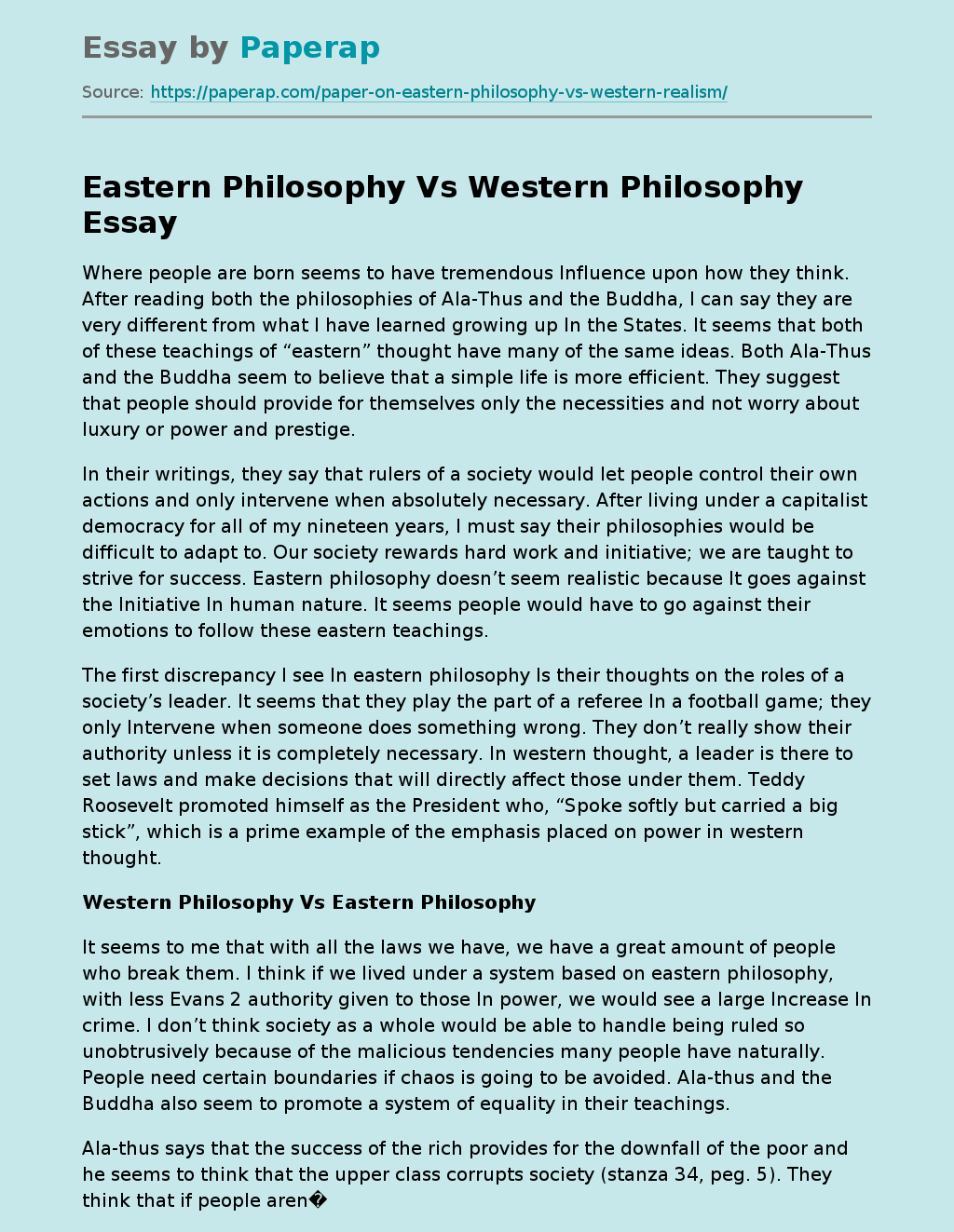Eastern Philosophy Vs Western Philosophy
Where people are born seems to have tremendous Influence upon how they think. After reading both the philosophies of Ala-Thus and the Buddha, I can say they are very different from what I have learned growing up In the States. It seems that both of these teachings of “eastern” thought have many of the same ideas. Both Ala-Thus and the Buddha seem to believe that a simple life is more efficient. They suggest that people should provide for themselves only the necessities and not worry about luxury or power and prestige.
In their writings, they say that rulers of a society would let people control their own actions and only intervene when absolutely necessary. After living under a capitalist democracy for all of my nineteen years, I must say their philosophies would be difficult to adapt to. Our society rewards hard work and initiative; we are taught to strive for success. Eastern philosophy doesn’t seem realistic because It goes against the Initiative In human nature.
It seems people would have to go against their emotions to follow these eastern teachings.
The first discrepancy I see In eastern philosophy Is their thoughts on the roles of a society’s leader. It seems that they play the part of a referee In a football game; they only Intervene when someone does something wrong. They don’t really show their authority unless it is completely necessary. In western thought, a leader is there to set laws and make decisions that will directly affect those under them.
Teddy Roosevelt promoted himself as the President who, “Spoke softly but carried a big stick”, which is a prime example of the emphasis placed on power in western thought.
Western Philosophy Vs Eastern Philosophy
It seems to me that with all the laws we have, we have a great amount of people who break them. I think if we lived under a system based on eastern philosophy, with less Evans 2 authority given to those In power, we would see a large Increase In crime. I don’t think society as a whole would be able to handle being ruled so unobtrusively because of the malicious tendencies many people have naturally. People need certain boundaries if chaos is going to be avoided. Ala-thus and the Buddha also seem to promote a system of equality in their teachings.
Ala-thus says that the success of the rich provides for the downfall of the poor and he seems to think that the upper class corrupts society (stanza 34, peg. 5). They think that if people aren’t concerned with prosperity, they will be much more content. This seems to go against everything I have ever learned; in western philosophy people are very concerned with success. People work hard to go to good schools, and then they work hard in school to get better Jobs. Nothing in western society comes easy; If you want to accomplish something, It takes hard work. It seems to me that this Is a much better policy than that of eastern thought.
Western society seems to be based on a “survival of the fittest” system, while easterners believe In savageness and equal opportunity. Their system would require people to hold back, to settle Tort second nest; It doesn’t seem to play to ten nature AT unmans well. Do people prefer doing things that don’t come naturally? Of course not, we want to be able to follow our emotions; we want to fulfill our inner needs. If we were forced to give up the opportunities of success and power, what would we live for? Eastern philosophy suggests that people shouldn’t want anything more than they have. How could we survive if we have nothing to work for?
Eastern Philosophy Vs Western Philosophy. (2019, Dec 05). Retrieved from https://paperap.com/paper-on-eastern-philosophy-vs-western-realism/

